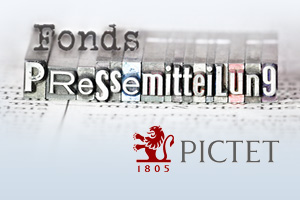 Pictet | Frankfurt, 08.04.2015.
Pictet | Frankfurt, 08.04.2015.
Sehr geehrte Damen und Herren, beigefügt erhalten Sie einen aktuellen Marktkommentar von Luca Paolini, Chefstratege bei Pictet Asset Management in London, zur aktuellen Asset Allocation. Wir freuen und über Ihr Interesse und senden beste Grüße, Oliver MOELLER, Head of Communication Germany & Austria, Tel. +49 69 79 5009 30, omoeller@pictet.com.
Europe and Japan remain our favoured markets says Luca Paolini, Pictet Asset Management
Luca Paolini, Chief Strategist Pictet Asset Management, explains why he still sees value in European and Japanese stocks and remains overweight; “Our regional allocation remains unchanged, with overweight positions in European and Japanese equities. Even though European stocks have outpaced their US counterparts in recent months, there is scope for this trend to gain further momentum over the near term.
“The improving macroeconomic backdrop in the single currency region is a major plus. German retail sales adjusted for inflation rose 5 per cent on the year in January, the highest level in 20 years. The recent wage settlement for metal workers also points to a strong increase in purchasing power for consumers. Moreover, the fall in the value of the EUR is serving to boost the competitiveness of companies in Southern Europe, particularly exporters based in Spain and Italy, while lending to non-financial corporates has risen.
“The economic surprise index for the euro zone – which tracks the extent to which data releases surpass or undershoot expectations – is at its most positive level for two years. And this is before the effects of the ECB’s quantitative easing are taken into account. Healthier business conditions are beginning to filter through to corporate earnings: profit forecast revisions across Europe are improving at a rapid pace. The net proportion of companies raising profit estimates relative to those cutting them has improved to – -1.5 per cent from – -10 seen at the end of last year.
“The situation in Europe compares favourably with the conditions we see in the US, where the strong USD is beginning to crimp the earnings of exporters and stocks look expensive on a range of valuation metrics. At just below 28, the cyclically-adjusted price-earnings ratio for the S&P 500 index is at the high end of its historical range, with the exception of the tech bubble. Taking all this into account, we expect the discount at which European stocks trade to US equities to narrow further – it is currently at around 5 per cent on a 12-month forward price-earnings basis.
“Japanese stocks also retain their appeal, in our view. Economic reforms, persistently loose monetary policy, and a weak JPY should continue to boost earnings momentum across corporate Japan. What is more, we are seeing increased evidence of an improvement in corporate governance across the country, which should result in more shareholder-friendly policies such as dividend increases, share buybacks and growth-boosting acquisitions.”
“We retain our positive stance on high–yield bonds. With economic conditions in the euro zone set to improve further in the months ahead and the Fed likely to deliver just one interest rate hike this year, the yield pick-up offered by sub-investment grade debt is attractive.”
“The technical picture is also positive. Although high yield issuers continue to tap the bond market, the payments investors are receiving from bond redemptions and coupons are flowing back into the asset class”.
Notes to the Editor
The Pictet Group
Founded in 1805 in Geneva, the Pictet Group is one of the premier independent asset and wealth management specialists in Europe, with GBP280 billion in assets under management and custody at 31st December 2014. The Pictet Group is owned and managed by seven partners with principles of ownership and succession that have remained unchanged since foundation.
Based in Geneva, the Pictet Group employs more than 3,600 staff. The Group has offices in the following financial centres: Amsterdam, Barcelona, Basel, Brussels, Dubai, Florence, Frankfurt, Hong Kong, Lausanne, London, Luxembourg, Madrid, Milan, Munich, Montreal, Nassau, Paris, Rome, Singapore, Turin, Taipei, Tel Aviv, Osaka, Tokyo and Zurich.
Pictet Asset Management (“PAM”) includes all the operating subsidiaries and divisions of the Pictet group that carry out institutional asset management and fund management such as Pictet Asset Management SA, a Swiss corporation registered with the Swiss Financial Market Supervisory Authority FINMA, Pictet Asset Management Limited, a UK company authorised and regulated by the Financial Conduct Authority, and Pictet Asset Management (Japan) Limited, a Japanese company regulated by the Financial Services Agency of Japan.
At 31st December 2014, Pictet Asset Management managed GBP97.2 billion in assets, invested in equity and bond markets worldwide. PAM has seventeen business development centres worldwide, extending from London, Geneva, Frankfurt, Amsterdam, Luxembourg, Madrid, Milan, Paris and Zurich via Dubai, Hong Kong, Taipei, Osaka, Tokyo and Singapore to Montreal.
ABOUT THE PSU
The Pictet Asset Management Strategy Unit (PSU) is the investment group responsible for providing asset allocation guidance across stocks, bonds, cash and commodities.
Each month, the PSU sets a broad policy stance based on its analysis of:
• business cycle: proprietary leading indicators, inflation
• liquidity: monetary policy, credit/money variables
• valuation: equity risk premium, yield gap, multiples vs. history
•sentiment: Pictet sentiment index (investors’ surveys, tactical indicators




